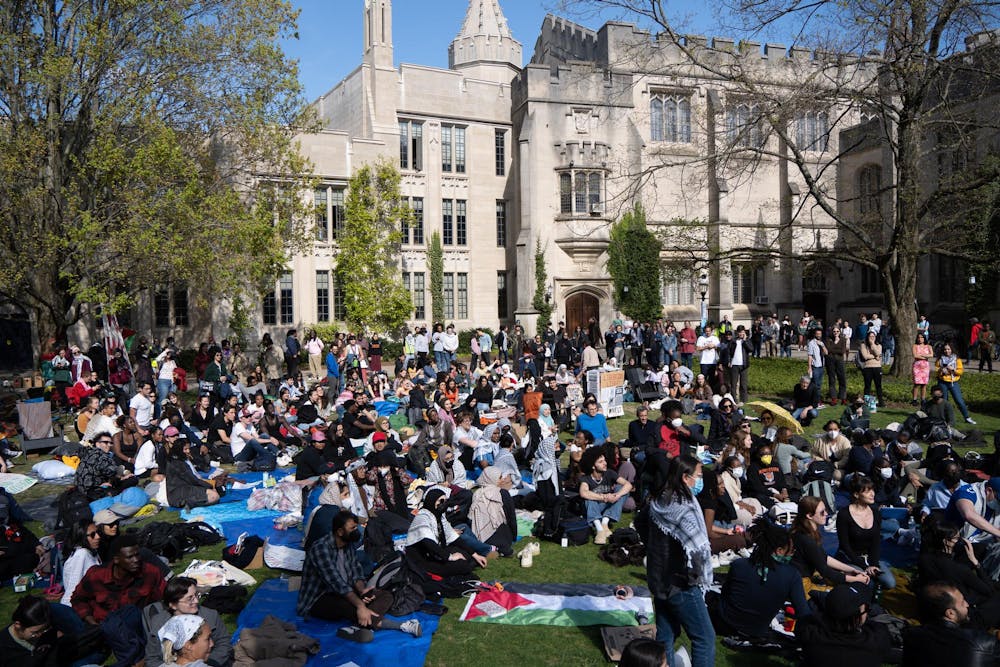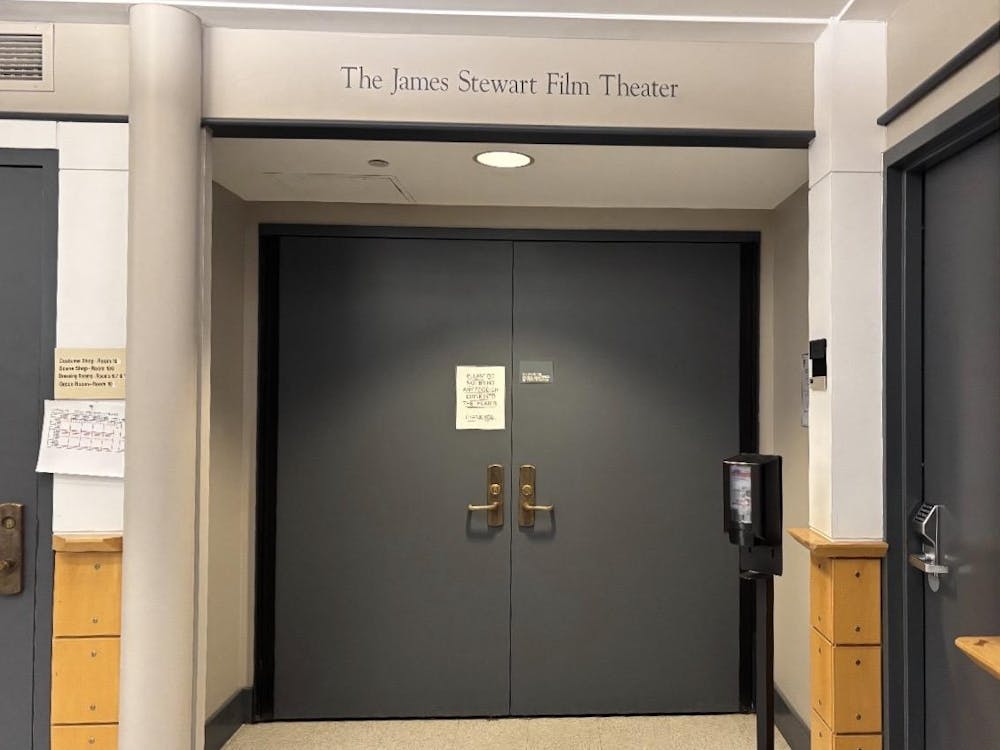This story is breaking and will be updated as further information becomes available.
On April 27, 145 faculty and postdoctoral researchers sent a letter to top University administrators, calling for “the immediate and full reinstatement” of Achinthya Sivalingam GS and Hassan Sayed GS, the two graduate students arrested early Thursday morning at the beginning of the Gaza solidarity sit-in in McCosh Courtyard. The two students remain barred from campus, but have been permitted to return to their non-dormitory housing that is owned by the University.
The letter also demands “that any and all punitive measures taken against the students be immediately reversed and expunged from their university and public records,” and calls for the University to “provide a public and transparent accounting of how disciplinary measures are going to be taken with students moving forward.”
“I appreciate the outpouring of support I’ve received from students, faculty, and community members, my alma mater Northwestern, friends across the world, and family. Professors offered places to stay in the half-day where I was evicted and had nowhere to go,” Sayed wrote in a statement to the ‘Prince’ on Saturday, saying that hundreds of people have been contacting the University to drop legal and disciplinary charges against him and Sivalingam.
“A university cannot simultaneously uphold its supposed ideals of free expression and speech while forcibly and arbitrarily barring students from campus, evicting them from housing, and threatening academic consequences for exercising those very rights,” he added.
The letter was sent to University President Christopher Eisgruber ’83, Provost Jennifer Rexford, Dean of the College Jill Dolan, Vice President for Campus Life W. Rochelle Calhoun, Dean of the Graduate School Rodney Priestley, and Dean of the Faculty Gene Jarrett.
Sayed’s Ph.D. advisors, Pietro Ortoleva, professor of economics and public affairs, and Leah Boustan, professor of economics, told The Daily Princetonian that they will continue to help Sayed with his research.
“We have been in contact with Hassan, and we will continue to meet him regularly off-campus to ensure that he can proceed with his research,” Ortoleva wrote to the ‘Prince.’

According to a post by Princeton Israeli Apartheid Divest (PIAD) on X, Sivalingam and Sayed were released by 9:02 a.m. Thursday morning. The post claimed they were “charged with trespassing and getting EVICTED from their on campus housing.”
“We shouldn’t have zip tied you so tightly” cops tell our students.
— Princeton Israeli Apartheid Divest (@PtonDivestNow) April 25, 2024
They’re being charged with trespassing and getting EVICTED from their on campus housing. pic.twitter.com/y67nspCNM7
“It seems like it’s a very trivial thing to arrest him,” Aamir Shabbir, Sayed’s father, told the ‘Prince’ on Friday morning. “I think, in my opinion, Princeton University administration also needs to rethink their policy. Are they just trying to bully or intimidate by making these two arrests and send a message or [is there] a deeper issue here?”
The two students were given five minutes to collect their belongings. While the post from PIAD, which had 72k views as of 1:25 a.m., claimed that the two students were evicted, University Spokesperson Michael Hotchkiss clarified that the students would be permitted to return to their housing, as the bar did not extend to non-dormitory residences.

“The University has not evicted anyone today. Under University protocol, Public Safety may initially accompany students barred from campus (regardless of reason) to their University housing to collect whatever belongings they require in the short term, until the specific terms of their bar from campus are determined by the designated administrator,” Hotchkiss wrote.
Christopher Catalano, vice president of Graduate Student Government (GSG), wrote in an email to the ‘Prince’ that the student government is “in communication with the administration of the Graduate School.”
He stressed that the GSG acknowledges the ability of the administration to “generally set the conditions of protest activities permitted on campus,” but expressed that “based on the information publicly available, we are not aware of a credible threat these students would pose to the safety of the campus community which would require they be barred from campus.”
Catalano also referred to the GSG Executive Board recommendations in his email, which reads, “If punitive actions must be pursued, the setting of Student Conduct proceedings is a far more appropriate forum than lodging criminal charges. The housing contracts of these students must be honored. These students be permitted (sic) to return to campus.”
Student protesters also received support from faculty, many of whom are affiliated with Faculty for Justice in Palestine (FJP). At least 12 faculty have spoken at the sit-in so far. These professors include: Ruha Benjamin, professor of African American studies; Max Weiss, associate professor of history; Behrooz Ghamari-Tabrizi, professor and chair of the Department of Near Eastern Studies; Dan-El Padilla Peralta, associate professor of classics; Augustín Fuentes, professor of anthropology; Keeanga-Yamahtta Taylor, professor of African American studies; Mitch McEwen, assistant professor at the School of Architecture; Tehseen Thaver, assistant professor of religion; Joshua Guild, associate professor of history and African American studies; Zia Mian, senior research scholar and co-director of Princeton University’s Program on Science and Global Security; Gyan Prakash, professor of history; and Ikaika Ramones, assistant professor of anthropology.
Assistant professors are hired into tenure-track positions, appointed for a three-year term, after the second of which they may apply for tenure and are then either terminated or promoted to full professorship. Associate professors are also appointed for three-years, after which their service is terminated, continued without limitation, or promoted to full professorship. Full professors and some associates professors have tenure.
Miriam Waldvogel is an associate News editor and the investigations editor for the ‘Prince.’ She is from Stockton, Calif. and often covers campus activism and University accountability.
Christopher Bao is an assistant News editor and the accessibility director for the ‘Prince.’ He is from Princeton, N.J. and typically covers town politics and life.
Olivia Sanchez is an associate News editor for the ‘Prince.’ She is from New Jersey and often covers the graduate school and academic departments.
Editor‘s Note: This piece has been updated to include comment from Sayed.
Correction: This piece has been updated to correct a quote from University spokesperson Michael Hotchkiss regarding the allegations of eviction, clarify tenure policies, and Professor Ruha Benjamin's role. The ‘Prince’ regrets these errors.








